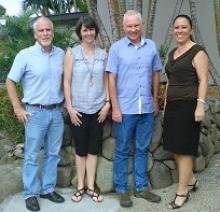IWG-ROP4 and ERandEMWG1 meetings held 6 – 10 July 2015

The first set of meetings of the Commission since the WCPFC Executive Director, Mr Feleti P Teo OBE, took office this March, were held from 6 – 10 July 2015, in Nadi, Fiji, in the form of two intersessional working group meetings. Around 60 WCPFC Commissioners, Observer Programme Coordinators, Fishery Managers and IT/database specialists attended the two meetings, representing WCPFC Members and observers from intergovernmental and non-governmental organizations.
In his opening remarks Mr Teo recognised and acknowledged the chairs of the four intersessional working groups noting that “these officials have their own full time jobs, and because of these roles entrusted on them they have to put in extra efforts at no costs to the Commission but to the enormous benefits of all members of the Commission. So I commend and applaud all their efforts and the cooperative and collaborative manners in which they have worked with the Secretariat.”
The fourth meeting of the Intersessional Working Group on the Regional Observer Programme (IWG-ROP4) met from 6 – 8 July, chaired by Raymond Clarke from United States of America. The IWG-ROP reviewed the operation and performance of the ROP and discussed ways to address the specific technical and operational issues identified and directed by the Commission in its meeting in Apia, Samoa last year. The underlying objective of the IWG-ROP is to recommend improvements to the ROP and to promote a more consistent and more common understanding of the application of the ROP.
The IWG-ROP recognized that the early years of implementing 100% observer coverage wasn’t without its challenges for many of the national and sub-regional observer programmes as they strove to ensure supply of qualified and well trained observers to the ROP. The ROP was established seven years ago, and for almost five years observer coverage in the tropical purse seine fishery has been at 100%. In more recent times, there are now the requirement for 100% observer monitoring on the carriers receiving high seas transshipments, and the requirement for a minimum of 5% observer coverage rate in longline fisheries which has been in place for almost two years. Participant agreed that the health and safety of the observer must be a paramount consideration in the deliberations during the IWG-ROP.
IWG-ROP4 provided recommendations to the Commission on guidelines for suggested mechanisms to prevent and deter misconduct of observers; guidelines for observer identification cards; recommended additional reporting requirements to support monitoring of high seas transshipment monitoring; and a proposed pre-notification process from observer providers to flag CCMs of possible alleged infringements by their vessels. Other topics which were reviewed by IWG-ROP4 included monitoring implementation of ROP longline coverage rates; definitions of terms and key principles of the ROP. More information on the IWG-ROP4 meeting, including the summary report is available from the website (http://www.wcpfc.int/meetings/IWGROP4).
The Inaugural meeting of the Electronic Reporting and Electronic Monitoring Intersessional Working Group (ERandEMWG1) met from 8 – 10 July, chaired by Kerry Smith from Australia. Participants worked solidly over two and half days and have recommended a set of draft electronic reporting standards for consideration at TCC11 and SC11 as appropriate. The recommended draft electronic reporting standards are to apply initially to five reporting requirements: Eastern High Seas Pocket Special Management Area reporting (CMM 2010-02); High Seas Pocket One Special Management Area reporting (CMM 2014-01 Attachment C); Manual position reporting in the event of ALC/MTU failure; Operational level catch and effort data and Observer data.
Electronic reporting was recognized as providing ways to enhance data accuracy, data entry efficiency, reducing reporting burden and avoiding duplication for vessel operators and national fisheries agencies, and the ERandEMWG therefore encourages CCMs and the Commission to develop policies and systems that allow e-reported information to satisfy data reporting requirements. The Commission agreeing to standards for electronically reported data would allow for the development of technologies in a way that suits the needs of CCMs and also ensures that the Commission is able to continue to support those members that are looking to implement electronic technologies. Electronic monitoring was seen as a medium term prospect with strong support for continuing trials, particularly on longline and carrier vessels, and developing standards and specifications. Electronic Monitoring systems are at early stages of development in the WCPO and participants noted that there needs to be further consideration of the challenges to implementation. More information on the ERandEMWG1 meeting, including the summary report is available from the website (https://www.wcpfc.int/meetings/ERandEMWG1).
Pictured in photo (left to right): Mr Raymond Clarke (IWG-ROP Chair, United States of America); Ms Kerry Smith (ErandEMWG Chair, Australia); Mr Peter Williams (Principal Fisheries Scientist -Data Management, SPC-OFP); Dr Lara Manarangi-Trott (Compliance Manager, WCPFC). Photo credit: Monte Depaune.

